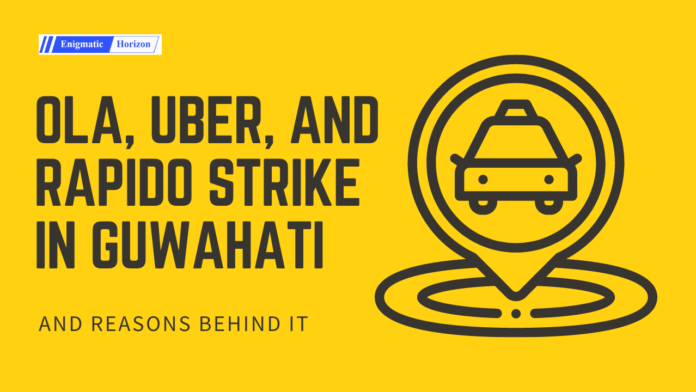With the world getting busier and faster with each passing day, the public’s need for more transportation is also growing. It is further paving a vast array of opportunities for various emerging enterprises. For the last few years in Assam, app-based transport service providers Ola, Uber, and Rapido have all been closely competing with one another. But at present, due to many serious issues, the drivers and riders of these three corporate houses have been on strike since February 1, 2023, and have decided to extend it until February 15. About 18,000 cab operators and 16,000 bike riders have joined the boycott call given by the trade union – All Assam Cab Mazdoor Sangh and All Guwahati Bike-Taxi Operator Union, in association with Chalok Oikya Mancha.
For the last few months, commuters have often faced weird and unexpected, unpleasant behaviors from some of the drivers and riders of these app-based transport organizations while using their services. Misbehavior and charging extra money, haggling, asking for cancellation and riding offline for a higher fee, and riding in an unprofessional way are especially bothering customers. There are reasons behind those, although these reasons can never be used as excuses for mistreating customers.
The General Secretary of the All Assam Cab Mazdoor Sangh said that health insurance, social security, and provident funds are supposed to be given to drivers under the Motor Vehicle Aggregator Guidelines 2020, but the aggregators did not do this.
The proposed guidelines as per the Motor Vehicle Aggregator Guidelines 2020 were-
- Regulation of aggregators,
- Eligibility conditions for of an entity to be an aggregator,
- Compliances concerning vehicles and drivers
- Compliances concerning Aggregator App and Website
- Manner of fare regulation,
- Drivers’ welfare
- Service to citizens’ parameters and ensuring safety
- Evolving concepts like pooling and ride-sharing in private cars,
- License fees/security deposit and powers that the State Governments.
But in reality, most of these guidelines are not being implemented.
Enigmatic Horizon contacted the trade union bodies of these cab drivers and bike riders in order to drag out sufficient information that would have enough logic for the boycott.
Jyotish Deka, general secretary of the All Assam Cab Mazdoor Sangh, said that in the first years, Ola and Uber gave the drivers and riders good incentives. But gradually, they started exploiting and harassing cab drivers. They started taking a huge amount of the commission from cab drivers and riders per trip, which is not reasonable. He also added that the cab software programs are also taking away the dynamic pricing from the cab and bike operators. They work for long hours daily. Besides, they have to pay installments to the banks and finance companies for loans against the vehicles and maintain their families with the meager income they make.
Ministry of Road Transport and Highways released the Motor Vehicle Aggregator Guidelines, 2020, according to Dhruvaraj Asom, a spokesman for the All Assam Cab Mazdoor Sangh, in December 2020. The Supreme Court of India told Uber, Ola, and other app-based ride-sharing services in India that they could only charge up to 20% commission on ride fares. That means the drivers should receive 80% of the ride fare per ride. But the reality is that the aggregators are violating this order too. The prime reason for the boycott going on in Assam is that the aggregators are charging the drivers and riders a minimum of 40%-50% commission. Besides, the aggregators are not taking any action for life security and social security like the provident fund of the drivers. Mr. Dhruvaraj stated that in the last three months, the aggregators have blocked more than 500 drivers’ and riders’ accounts, without any prior notice or explanation. Regarding this, the central government and some state governments also do not have much data. Although the government is aware of these violations by the aggregators in the state, it is still completely silent in this case for some mysterious reasons. The system software is also defective; which does not show on the drivers’ and riders’ mobile phones about the charge and destination.
He told Nayanjyoti Sarma, the General Secretary of the All Guwahati Bike-Taxi Operator Union, the same things that Mr. Dhruvaraj Asom had said. Mr. Sarma added that the two-wheelers are not getting the yellow license plates as they should. Besides, there is also a serious issue with parcel delivery, as if the address for the delivery is not found, the rider has almost no place to return it, which creates many problems for them. He complained of no cooperation from the district transport officers’ offices. Also, the aggregators do not make any arrangements for the training of the drivers and riders. The aggregators allow any person to register as a rider under them and don’t go through much document verification, which may put the passengers in danger. The riders also do not get any compensation in case of an accident, loss of the vehicle, etc. There is also no easily accessible customer care service for these aggregators. However, Mr. Sarma strongly condemns the act of some riders charging higher than the amount shown in the customers’ apps and mistreating customers just because the riders are highly compensated by the aggregators. But he also adds that upon receiving a complaint from a customer, they can only seek an explanation from and warn the rider, but they have no right to punish the rider.
“PeIndia” and “an2,” which are both registered in Guwahati, are the names of two new app-based private transportation companies. PeIndia charges the drivers and riders around 15%, and an2 charges 18%-20% commission, with which they are satisfied.
It is still unsure whether the government and the aggregators will take the matter seriously. Hopefully, the matter will be resolved soon, and the drivers and riders, along with the masses of customers, will stop the suffering and enjoy their travel at a cheaper price, along with saving time and staying safe.
